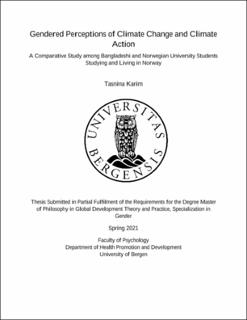| dc.description.abstract | Climate change has become a global concern for sustainable development, in that it will go beyond nature’s mitigating capability unless carbon emissions are minimized. People, particularly the young generation, are experiencing the uncertain and adverse impacts of climate change in all aspects of their lives. So, incorporating sustainable lifestyle choices and reducing carbon emission are crucial concerns for climate change mitigation. Additionally, gender is inextricably linked to climate vulnerability and mitigation action and gender, and climate change has been widely researched in light of sustainable development goals and development studies. To the best of my knowledge, no qualitative research has been undertaken focusing on the young generation to understand and compare how different climate experiences and sociocultural settings shape gendered climate change perceptions and climate action. This study explores and compares gendered perceptions of climate change and climate action among Norwegian and Bangladeshi students studying and living in Norway. An interpretive phenomenological approach was applied to explore how climate change and gender are perceived by the students. This study is qualitative, and the method employed for data generation was semi-structured interviews. Individual interviews were conducted with six Bangladeshi and six Norwegian universities students with the equal male-female distribution. All the participants were students at different Norwegian universities and were living in Norway. Thematic Network Analysis (TNA) was used for data analysis after coding in NVivo. The study found that participants, regardless of their national background, are knowledgeable about climate change, mitigation actions, and the association between climate change and gender. Though all participants could identify the changes in their surrounding environment, Bangladeshi participants reflected more on the natural changes than the Norwegians; in fact, climate change-driven impacts on their society were not mentioned by any Norwegian participants. Media, politics, and the education system played a significant role in shaping participants’ understanding of climate change, and media influenced participants’ climate action in particular. The study showed that climate awareness does not always lead to choosing mitigation action. Gender norms influence how participants perceived the link between climate change and gender, and this perception could further impact participants' climate mitigation action and inaction. Besides, the findings revealed that financial inability, lack of proper climate-friendly facilities, and sociocultural background were reasons for participants’ climate inaction; still, the study found that there were gender differences in participants' climate action. Their individual climate actions were linked explicitly and implicitly to their ‘doing gender’ and attempt to adhere to the ideals of masculinity and femininity. In addition, the gender identity of an individual could be endangered depending on the climate action taken; for example, the study findings indicate that male participants’ meat consumption was indirectly associated with their masculine identity, whereas female participants' consumption of clothes could come from a social pressure to conform to feminine ideals. Gender, climate education, geographical location and experience of climate-induced events influence climate change understanding. While exploring students’ perception of climate change, it seemed that Bangladeshi participants were more aware and informed than the Norwegian participants. However, when comparing along gendered lines, female participants appeared as more concerned and expressed more emotional disturbance for the environment than male participants. Though climate actions were associated with gendered expectations stemming from traditional views on masculinity and femininity, emergent features related to notions of ‘new masculinity’ and ‘undoing gender’ could stimulate gender equality in climate mitigation action. | |
